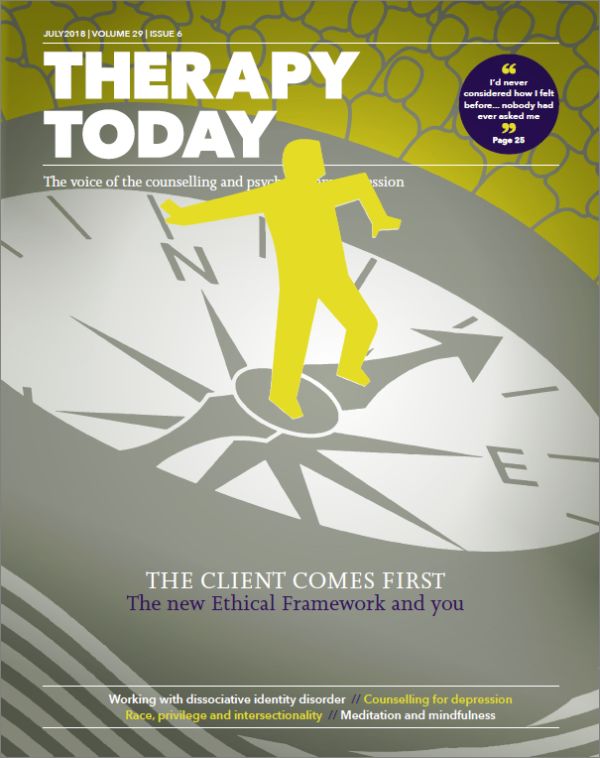In this issue
Here and now
News feature: The only way is ethics (free article)
With the latest revision of the Ethical Framework, has the counselling profession finally grown up? Catherine Jackson reports
The big issues
Flying to the future
Consuelo Farina is challenged by a client with dissociative identity disorder.
Counselling for depression
Rinda Haake explains the IAPT model of counselling for depression.
Privilege, shame and supremacy
Dwight Turner explores a recent encounter with privilege in the therapy room.
Dark night of the soul
Duncan Barford explains why meditation should not be seen as therapy.
Regulars
Turning point
Wisdom from experience.
Research matters
John McLeod picks cutting-edge studies from the journals.
Dilemmas
Trainee Giovanna’s client feels short-changed.
Talking point
Has becoming a counsellor changed you?
Self-care
Sally Belsham sings in a barbershop choir.
Analyse me
Brett Kahr answers our questionnaire.
Your association

A pdf of this issue is available in the Therapy Today archive
Editor’s note
Mindfulness is ubiquitous these days. It’s in our schools, our workplaces, even our Houses of Parliament. It is generally promoted as a form of meditation-lite.
But some say we Westerners have taken an ancient Eastern philosophy and bowdlerised it into a self-help cure-all for the ill-effects of our stress-filled 21st-century lifestyle. We recommend mindfulness as an antidote to the effects of working too hard to achieve ever-higher goals in an increasingly individualised, competitive and unthinking race, without regard for the vastly complex philosophy and belief system that underpins it. As Duncan Barford explains in this issue, Buddha taught meditation to achieve ‘bodhi’, or ‘awakening’, not to our true inner self but to the realisation that the self itself is an illusion – it does not exist. We then have to live with that terrible knowledge.
Meditation is not a practice to introduce to someone who has a shaky hold on their sense of identity and self-worth, he argues, and therapists would do well to understand the potential dangers. To my mind, the Welsh poet WH Davies offered a much simpler solution to the woes of the industrialised Western world, when he wrote, back in 1911: ‘What is this life if, full of care,/ We have no time to stand and stare./ No time to stand beneath the boughs/ And stare as long as sheep or cows.’ As Nevena Curcic, a contributor to this month’s Talking Point, tells us, in Serbo-Croat they call this blejanje – the ruminative sound of a sheep going ‘baaaa’. We take a break in August, so I’ll take this opportunity to encourage you all to indulge in more blejanje and less frenetic achievement over the summer. Until September.
Catherine Jackson
Editor
Who knew therapists could be faced with so many different ethical conundrums? It can seem like a minefield. I’m sure our regular Dilemmas column is so popular because it brings a potentially dry subject – ethics in counselling – to full and colourful life.
The news feature this month focuses on the changes to the BACP Ethical Framework and why this needs to be a living, developing document. It’s great to have it as a sturdy backdrop to our work. Even so, it can be hard to hold it all in mind at any one time. Alistair Ross makes the point that always putting the client’s best interests at the centre of your therapy is a great guiding principle for ethical decision-making.
It reminds me of a golden rule a tutor once armed me with: ‘Always work with active beneficence and non-maleficence at the front of your mind, and you won’t go far wrong.’
Rachel Shattock Dawson
Consultant Editor
